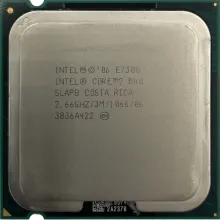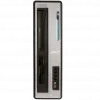
The Intel Core2 Duo Processor E7300, released in 2008, was part of the Core 2 Duo lineup based on the Wolfdale microarchitecture. Built on a 45nm manufacturing process, the E7300 represented a significant advancement over its predecessor, featuring improvements in power efficiency and performance. With a base clock speed of 2.66 GHz, it delivered a balance of computing power suitable for mid-range desktop systems of its time.
The processor's architecture included two physical cores, and it supported Intel's Hyper-Threading Technology, allowing each core to handle two threads simultaneously. This contributed to improved multitasking capabilities and overall system responsiveness. The E7300 featured a 3 MB L2 cache, shared between its two cores, enhancing data access speeds and contributing to its performance in various computing tasks.
The front-side bus (FSB) speed of the Core 2 Duo E7300 was set at 1066 MHz, facilitating high-speed data transfer between the processor and other system components such as the memory and chipset. This FSB speed, coupled with the dual-core architecture, made the E7300 well-suited for handling a range of applications, from office productivity tasks to moderate multimedia and gaming demands.
The processor's thermal design power (TDP) was relatively modest, contributing to its reputation for power efficiency. This was crucial for desktop systems seeking a balance between performance and energy consumption. The E7300 also supported a range of Intel technologies, including Enhanced Intel SpeedStep Technology, which dynamically adjusted the processor's voltage and frequency based on workload, further optimizing power usage.
While the Intel Core2 Duo E7300 was a reliable performer in its heyday, subsequent advancements in processor technology, including the introduction of multi-core processors and architectural improvements, have rendered it outdated for modern computing demands. Contemporary processors offer higher clock speeds, increased core counts, and more advanced technologies, resulting in superior performance and efficiency.
